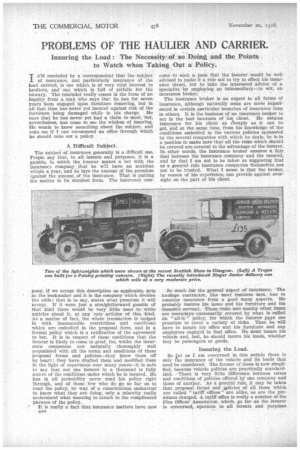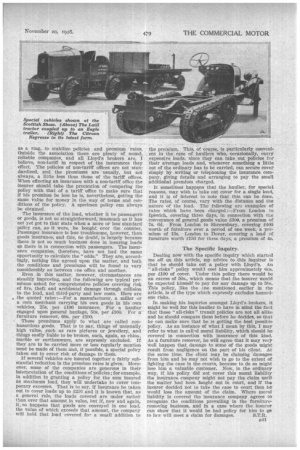PROBLEMS OF THE HAULIER AND CARRIER.
Page 36

Page 37

If you've noticed an error in this article please click here to report it so we can fix it.
Insuring the Load : The Necessity of so Doing and the Points to Watch when Taking Out a Policy.
T AM reminded by a-correspondent that the subject of insurance, and particularly insurance of the load carried, is one which is of very vital interest to hauliers, and oua which is full of pitfalls for the unwary. The reminder really comes in the form of an inquiry froth a mail who says that he has for seven years been engaged upon furniture removing, but in all that time has never yet insured against risk of the furniture being damaged while in his charge. He says that he has never yet had a claim to meet, but, nevertheless, has come to • see the vvisdom of insuring. He wants to know something about the subject, and asks, me if can recommend an office through which he should take out a policy.
A Difficult Subject.
The subject' of insurance generally is a difficult one. People say that, to all intents and purposes, it is a gamble, in which the insurer makes a bet with the insurance. company _that he will have an accident within a year, and he lays the amount of the premium against the amount of the insurance. That is putting the matter in its simplest form. The insurance corn party, if we accept this description as applicable, acts as the bookmaker and it is the company which decides the odds ; that is to say, states what premium it will accept. If it were just a straightforward gamble of that kind there would he very little need to write articles about it, at any rate articles of this kind. As a matter of fact, the whole transaction is hedged in with innumerable restrictions and conditions which are embodied in the proposal form, and in a formal policy which is a ratification of the agreement to bet. It is in respect of these conditions that the insurer is likely to come to grief, for, whilst the insurance companies are naturally thoroughly well acquainted with all the terms and conditions of these proposal forms and policies—they know them off by heart ; they have drafted them and modified them in the light of experience over many years—it is safe to say that not one insurer in a thousand is fully aware of the conditions under which he is insured. He has in all probability never read his policy right through, and of those few who do go so far as to read the policy, by way of a conscientious endeavour to know what they are doing, only a minority really understand what meaning to attach to the complicated phrases of the policy.
It is really a fact that insurance matters have now B
come to such a pass that the insurer would be well advised to make it a rule not to try to effect his insurance direct, but to take the interested advice of a specialist by employing an intermediary—to wit, an insurance broker.
The insurance broker is an expert in all forms of insurance, although naturally some are more experienced in certain particular branches of insurance than in others. It is the business of an insurance broker to act in the best interests of his client. He obtains insurance for his client as cheaply as it can be got, and at the same time, from his knowledge of the conditions embodied in the various policies sponsored by the several companies with which he deals, he is in a position to make sure that all the risks which should be covered are covered to the advantage of the insurer. In other words, the insurance broker ensures a fair deal between the insurance company and the insured, and by that I am not to be taken as suggesting that as a general rule insurance corapanieS themselves are not to be trusted. What I mean is that the broker, by reason of his experience, can provide against oversight on the part of his client.
So much for the general aspect of insurance. The haulage contractor, like mot business men, has to consider insurance from a good many aspects. He probably insures his home and his furniture and his domeatic servant. These risks and sundry other items are nowadays customarily covered by what is called an " all-in " policy, for which the insurer. pays one premium to cover a variety of risks. Then he will have to insure his office and his furniture and any employees engaged in that office. He must insure his vehicle and, last, he should insure his loads, whether they be passengers or goods.
Insuring the Load.
So lar as I am concerned in this article there is only the insurance of the vehicle and its loads that need be considered. The former of these is now simplified, because vehicle policies are practically standardized. There is very little difference between terms and conditions of policies offered by' one company and those of another. As a general rule, it may be taken that proposal forms and pnlicies of all those which are called "tariff offices" are alike, as are the premiums charged. A tariff office is really a member of the Fire Offices' Association, which, ao far as the insurer is concerned, operates to all intents and purposes as a ring, to stabilize policies and premium rates. Outside the association there are plenty of sound, reliable companies, and all Lloyd's brokers are, I believe, non-tariff in respect of the insurances they effect. The policies of non-tariff offices are not stan dardized, and the premiums are usually, but not always, a little less than those of the tariff offices. When effecting an insurance with a non-tariff office the insurer should take the precaution of comparing the policy with that of a tariff office to make sure that if his premium be less he is, nevertheless, getting the same value for money in the way of terms and conditions of the policy. A specimen policy can always be obtained.
The insurance of the load, whether it be passengers or goods, is not so straightforward, inasmuch as it has not yet got to that state when a more or less standard policy can, as it were, be bought over the counter. Passenger insurance is less troublesome, however, than goods insurance, and this, no doubt, is largely because
there is not so much business done in insuring loads as there is in connection with passengers. The insur
ance companies, therefore, have not had the same opportunity to calculate the "odds" They are accordingly, nothing like agreed upon the matter, and both the conditions and premiums will be found to vary considerably as between one office and another.
Even In this matter, however, circumstances are steadily improving, and the following are typical pre miums asked for comprehensive policies covering risk of fire, theft and accidental damage through collision to the load, and third-party and law costs. Here are the quoted rates :—For a manufacturer, a miller or a corn merchant carrying his own goods in his own vehicles, 25s. per 1100 insurance. For a haulier engaged upon general haulage, 50s. per £100. For a furniture remover, 60s. per £100.
These premiums apply to what are called nonhazardous goods. That is to say, things of unusually high value, such as rare pictures or jewellery, and things easily liable to be broken, such, again, as china, marble or earthenware, are expressly excluded. If they are to be carried more or less regularly mention must be made of them and, if possible, a special policy taken out to cover risk of damage to them.
If several' vehicles are insured together a fairly substantial reduction in the premium rates is given. More
over, some of the companies are generous in their Interpretation of the conditions of policies; for example, in addition to granting a policy for the sum insured
as maximum load; they will undertake to cover temporary excesses. That is to say, if insurance be taken
out to cover loads up to £250 and it is known that, as a general rule, the loads covered are under rather than over that amount in value, but if, now and again, it, so happens that goods are conveyed in one load, the value of which exceeds that amount, the company will hold that load covered foa a small addition to
the premium. This of course, is particularly convenient in the case of hauliers who, occasionally, carry expensive loads, since they can take out policies for their average loads and, whenever something a little out of the ordinary has to be carried, can secure cover simply by writing or telephoning the insurance company, giving details and arranging to pay the small additiohal premium charged.
It sometimes happens that the haulier, for special reasons, may wish to take out cover for a single load, and it is of interest to note that this can be done. The rates, of course, vary with the distance and the nature of the load. The following• aro examples of rates which have been charged :—From London to Ipswich, covering three days, in connection with the conveyance of general goods value f300, a premium of 7s. 6d. From London to Shrewsbury, covering £400 worth of furniture over a period of one week, a premium of 13s. London to Dover, covering a load of furniture worth 1150 for three days, a premium of 4s.
The Specific Inquiry.
Dealing now with the specific inquiry which started me off on this article, my advice to this inquirer is that he should take out a policy with Lloyd's. An "all-risks" policy would cost him approximately 60s. per £100 of cover. Under this policy there would be an excess of 50s., which means that the insurer would be expected himself to pay for any damage up to 50s. This policy, like the one mentioned earlier in the article, is of the type which expressly excludes hazardous risks.
In making his inquiries amongst Lloyd's brokers, it might be well for this haulier to have in niind the fact that these "all-risks" transit policies are not all alike and he should compare them before he decides, so that he can make sure that he is getting the best possible policy. As an instance of what I mean by this, I may refer to what is call-td moral liability, which should be covered in connection with insurance of this kind. As a furniture remover, he will agree that it may verk well happen that damage to some of the goods might result from negligence on the part of his client. At the same time, the client may be claiming 'damages from him and he may not wish to go to the extent of fighting the case in the courts, because to do so might lose him a valuable customer, Now, in the ordinary way, if his policy did not cover this moral liability the insurance company might not pay the claim until the matter had been fought out in court, and if the insurer decided not to take the case to court then he would lose the amount of the claim. Where moral liability is covered the insurance company agrees to recognize the conditions prevailing in the furnitureremoving business, and in a case where the insurer can show that it would be bad policy for him to go
to law will meet a claim for damages. S.T.R.








































